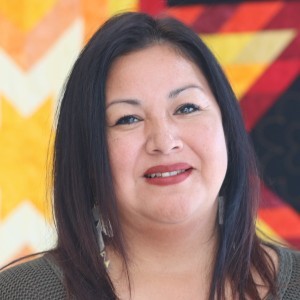Leona Star
 I am a Nēhiyaw iskwe (Cree woman), I grew up in my community in Thunderchild First Nation, along the Saskatchewan River located within Treaty Six territory. I attended the First Nations University of Canada in 2000 to pursue a Bachelor of Administration degree. As a parent, as a Nēhiyaw iskwe, I understand that everything we do in this lifetime is for those who are yet to come, our great grandchildren who are yet to be born. I understand the sacrifices and struggles that my ancestors and my family endured for me to be here, to have a good life. It is with this understanding, of what ties us together through the seven generations, which I’ve applied to the MDP in Indigenous Development, to honour my ancestors, to honour my responsibility to my children, and grandchildren who are yet to come.
I am a Nēhiyaw iskwe (Cree woman), I grew up in my community in Thunderchild First Nation, along the Saskatchewan River located within Treaty Six territory. I attended the First Nations University of Canada in 2000 to pursue a Bachelor of Administration degree. As a parent, as a Nēhiyaw iskwe, I understand that everything we do in this lifetime is for those who are yet to come, our great grandchildren who are yet to be born. I understand the sacrifices and struggles that my ancestors and my family endured for me to be here, to have a good life. It is with this understanding, of what ties us together through the seven generations, which I’ve applied to the MDP in Indigenous Development, to honour my ancestors, to honour my responsibility to my children, and grandchildren who are yet to come.
I have been working in First Nations health research over the span of 10 years after I left university to provide for my family. Although I have not completed my undergraduate degree, I have been trained by a long list of mentors, knowledge keepers, and community members for over the past 10 years in the area of First Nations self-determination in are areas of research, data governance and the development of Nation based indicators of wellbeing. I feel blessed to have had the opportunity to sit with and be mentored from some of the most renowned Indigenous scholars across Canada, who continue to create pathways for the next generation of helpers by pushing the boundaries and creating space for Indigenous worldviews, knowledges, and sciences.
I have always navigated walking in two worlds, I understand what it is to be a Nēhiyaw iskwe learning within a western education system. It is a system that was never built for us Indigenous people, it was there to assimilate us into a western frame of thought, with the intent, “to kill the Indian in the child”. Growing up in Thunderchild, connected to land, to ceremonies, I am inherently connected to a worldview that cannot be taught within any academic institution. I come from a long line of survivors; I am also a survivor in spite of the attempted cultural genocide on our people, our ways, and our ceremonies. I know the responsibilities that I carry, it is from this place of love for my family, my children, my great grandchildren, those generations yet to come, this is one of my reasons why I have applied to enter this program. I have been trained by both our own knowledge keepers and Indigenous scholars outside of a western system, I feel inspired, prepared, and supported to go back to school because I know who I am as a Nēhiyaw iskwe.
I am a strong advocate of First Nations self-determination in research grounded in the First Nations principles of Ownership, Control, Access, and Possession (OCAP). I follow the Regional Health Survey model and framework to ensure the highest standards of First Nations research ethics are upheld in all research projects that include Manitoba First Nations. I have worked collaboratively locally, regionally, and nationally to ensure research and information is governed according to protocols defined by First Nations.
I work alongside the FNHSSM research team to provide support to the Manitoba First Nations Ethics review committee called the Health Information Research Governance Committee (HIRGC). The HIRGC reviews regional research projects to ensure the adherence to the First Nations principles of OCAP, Free Prior and Informed Consent on a collective and individual basis, First Nations Ethical Principles and Benefits to First Nations. These four criteria have been supported by the Chiefs in Assembly and are written within the bylaws of FNHSSM to ensure that research that involves Manitoba First Nations is based on a respectful research relationship from the beginning.
I have contributed to many research projects in various roles, my main role is that I am a helper for our First Nations people, communities, and organizations when it comes to respectful relationships and self-determination in research and data sovereignty.
